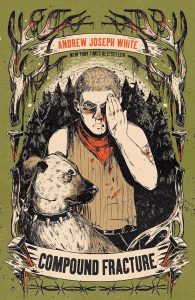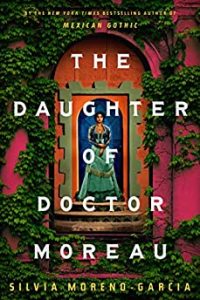Compound Fracture by Andrew Joseph White: Review by Alex Brown
 Compound Fracture, Andrew Joseph White (Peachtree Teen 978-1-68263-612-1, $19.99, 384pp, hc) September 2024.
Compound Fracture, Andrew Joseph White (Peachtree Teen 978-1-68263-612-1, $19.99, 384pp, hc) September 2024.
Teens fighting against the forces of empire or capitalism is a common theme in young adult fiction. Oftentimes, the teen protagonist has a couple sidekicks and a love interest or two who help them wage battle, but it’s up to our hero to defeat the Big Bad and save the day. The empire or corporation is defeated and all is well. However, these books often just replace one all-powerful ruler with another. The revolutions are bloody, but it’s all at a distance, with the exception of one sidekick who usually gets killed to give emotional weight to the protagonist’s journey. We don’t see what it’s like to be a regular person caught in the machinery, only the chosen ones who have risen above such drudgery. Andrew Joseph White’s Compound Fracture is a refutation of those tropes.
For more than a century, the Abernathys have been stirring up trouble in the small mining town of Twist Creek, West Virginia. Good trouble if you ask them – all they’re doing is trying to protect locals from exploitation and abuse. Bad trouble if you ask Sheriff Davies and his family – to them the Abernathys are nothing more than rabble-rousers intent on disrupting a system working as intended. The night Miles comes out as trans is also the night he decides to make a move against the Davieses by releasing photos taken of the sheriff’s involvement in a staged accident that badly injured Miles’s father and cost others their lives. It also happens to be the same night when the sheriff’s son Noah retaliates against Miles by nearly beating him to death.
While in recovery, first from his injuries and later from an addiction to painkillers, Miles begins to see the spirit of a dead man with a railroad spike jammed in his mouth. Is Miles hallucinating? Is it a real ghost? Whatever Miles is experiencing, it inspires him to take matters into his own hands. With the help of his friend Cooper, he crafts a plan to not only get revenge for the Davies’ myriad victims but also finally shatter the chains binding them to the oppressive system the Davies lord over. But as Miles soon learns, revolution is not a solitary act. It must be done with a coalition; it must be done in community.
Compound Fracture is marketed as a paranormal thriller, but to me it read like a horror novel. The murders are described in lurid detail so visceral that White makes you almost smell the tang of blood. At one point, he lingers on the sound of a tooth hitting the floor after falling out of the mouth of someone who was just shot, then lingers on the mangled face of said victim. People are burned alive, beaten, gutted, stabbed, and shot. It’s intense, to say the least. I alternated between the audiobook and print book, largely because sometimes the audio got too much for me (I’m a lightweight when it comes to horror).
Coincidentally, I read Compound Fracture and August Clarke’s new second world fantasy Metal from Heaven back-to-back. These books by two powerful trans authors make a great double feature, with both tackling the same themes of capitalism, empire, and socialist revolutions and coming to similar conclusions on building communities and coalitions and understanding that there are many small battles to fight over years rather than one big climactic war. Both write about queer and trans characters breaking free of the social rules of the majority, whether it be rejecting cisheteronormativity or centering neurodiversity. Where they differ really is their audience. Clarke has written YA before – their Scapegracers trilogy is one of my favorite YA fantasies of the 2020s so far – but Metal from Heaven is solidly adult fiction. White is clearly writing for teens here, yet he doesn’t talk down to them or soften the edges. He knows Gens Z and Alpha are having the same conversations Marney from Clarke’s book and Miles from his book are having.
What makes this book so necessary is seeing Miles discover new aspects of himself while living in a region that works extremely hard to keep those aspects hidden. People often talk about reading banned books, but book banners don’t actually care about the books themselves. The goal of a ban is to remove options for kids; to make them think there is only the narrow, constrictive box the bigots have shoved them into. Books like Andrew Joseph White’s Compound Fracture show kids that they don’t have to accept the world as it is. There are other ways to live. Maybe they’re not bad at socializing and fitting in, but are actually autistic. Maybe they’re not broken when it comes to relationships, but are really just asexual or aromantic. Maybe they’re not trapped in an endless cycle of poverty and violence, but able to strive toward something more communal. If kids have options, they won’t accept the pittance the bigots are offering. Compliance’s worst enemy is a kid who is brave enough to say, “I don’t want this, I want that instead.”
Interested in this title? Your purchase through the links below brings us a small amount of affiliate income and helps us keep doing all the reviews you love to read!
Alex Brown is a librarian, author, historian, and Hugo-nominated and Ignyte award-winning critic who writes about speculative fiction, young adult fiction, librarianship, and Black history.
This review and more like it in the December 2024 issue of Locus.
 While you are here, please take a moment to support Locus with a one-time or recurring donation. We rely on reader donations to keep the magazine and site going, and would like to keep the site paywall free, but WE NEED YOUR FINANCIAL SUPPORT to continue quality coverage of the science fiction and fantasy field.
While you are here, please take a moment to support Locus with a one-time or recurring donation. We rely on reader donations to keep the magazine and site going, and would like to keep the site paywall free, but WE NEED YOUR FINANCIAL SUPPORT to continue quality coverage of the science fiction and fantasy field.
©Locus Magazine. Copyrighted material may not be republished without permission of LSFF.








